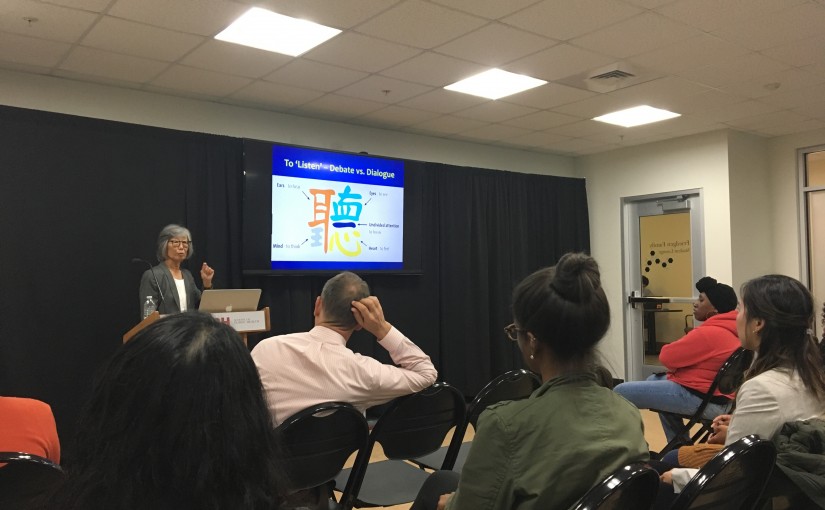By Elana Morris
For The Diamondback
Marjorie Kagawa-Singer, a UCLA public health professor, spoke at the University of Maryland on Tuesday about her experiences with diversity in the field of public health.
In front of about 30 attendees at the School of Public Health building, Kagawa-Singer — the director of equity, diversity and inclusion and research professor at UCLA’s public health school — emphasized the importance of acknowledging different perspectives in research and academia.
The event, hosted by the Diversity and Inclusion Council in this university’s public health school, is part of an ongoing conversation about diversity on college campuses.
During the event, Kagawa-Singer spoke about initiatives created at UCLA to increase diversity awareness, such as a student-run class on the Black Lives Matter movement, and a jazz concert series inspired by the poetry of Langston Hughes.
She compared this university to UCLA, highlighting the diversity on both campuses, as well as the need to adapt to a changing and increasingly diverse academic environment.
“When we’re born, our parents and our communities refract a lens through which we see reality,” Kagawa-Singer said. “Each one is slightly different depending on what community you belong to.”
Kagawa-Singer encouraged audience members to explore this difference in perspective by taking turns divulging information about their upbringings with a partner for two minutes without interruption.
She used the activity to demonstrate her observations on how minorities might respond differently to personal questions depending on the setting.
Kagawa-Singer emphasized that it is necessary to be able to communicate with people to get accurate answers to questions regarding health and individual experience. She said dialogue, not debate, is the only way to accomplish this.
“We only give out snippets of ourselves when it’s safe to do so,” she said. “Very rarely do we just take the time to find out who the person is. And it’s that social connection that we often lose in an academic setting.”
Craig Fryer, a behavioral and community health professor in this university’s public health school, raised the issue of faculty representation during the dialogue.
Creating an atmosphere where minorities feel comfortable and included is more complicated than simply hiring more diverse faculty, Fryer said, adding that diversity training for students and faculty would help create an atmosphere of inclusivity.
“There’s a huge assumption that racial concordance is the … magic bullet,” he said. “It used to be that if you wanted to include African-Americans, you include African-Americans on the research team. I think that’s the start. I don’t think that’s the full solution.”
Amina Faizan, a behavioral and community health graduate student, said she has always felt included at this university as a Muslim, but she added that she believes she is the exception, not the rule.
“There are a lot of professors that would probably say [inclusivity is] a very new concept in research now,” Faizan said. “This stuff is pretty new, and I just think it’s gonna take a while for a lot more dialogue like this to happen … especially given the climate in the United States these days.”
Epidemiology professor Olivia Carter-Pokras, an acquaintance of Kagawa-Singer and an organizer of the event, expressed optimism about the university’s mission to increase diversity and inclusion.
“One of the things that I think is important to recognize is the University of Maryland is doing a lot of things right in terms of diversity and inclusion,” she said. “We need to do a better job at celebrating those accomplishments, as well as recognizing opportunities for improvement.”



